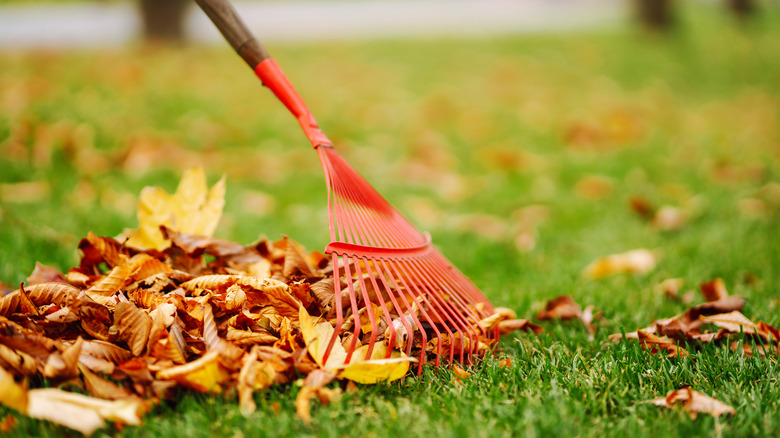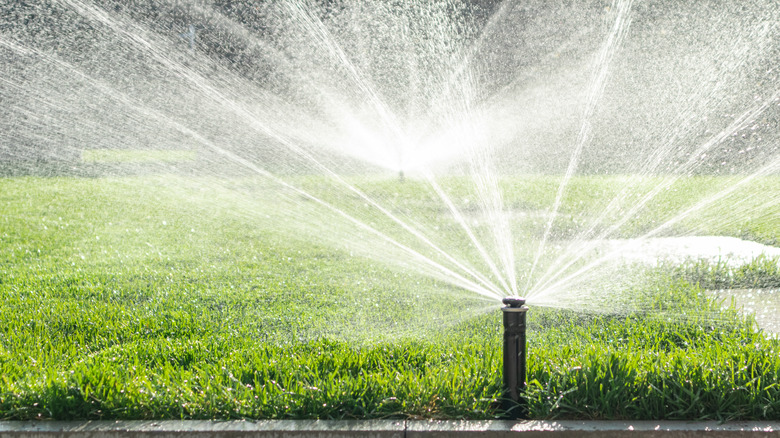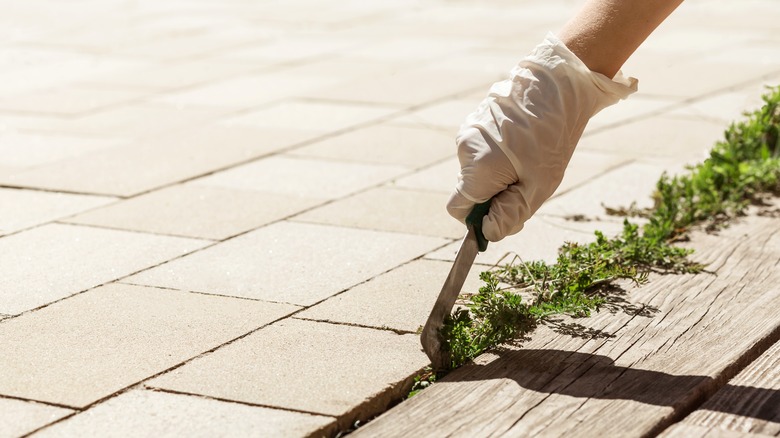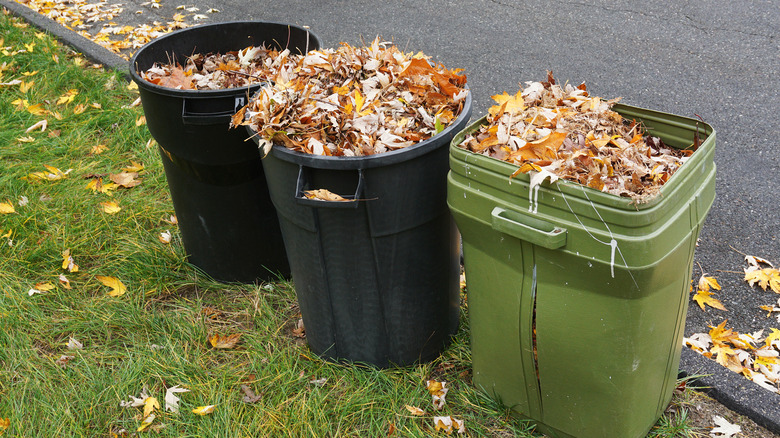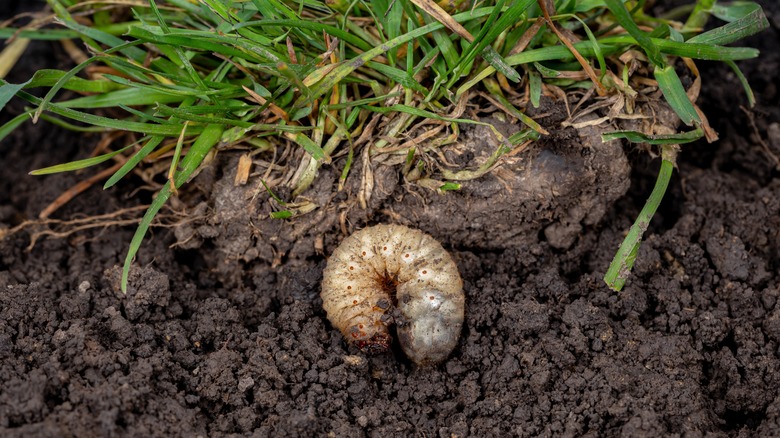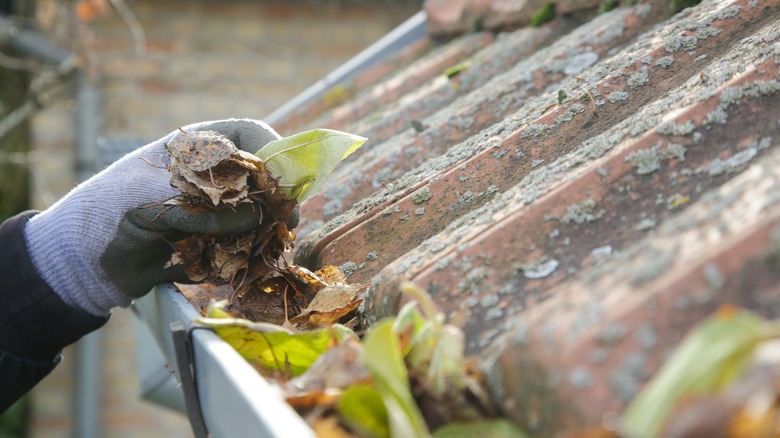Mistakes To Avoid When Maintaining Your Yard In The Fall
When the sun starts setting earlier and the weather becomes colder, it means we're at the peak of the autumn season. Since it's the best time to stay as warm as possible, keeping up with some of our daily tasks, like yard work, can be challenging. It's simple to let the yard get a break and grow as much as it can before spring comes around, but doing that brings consequences. For example, not maintaining your yard can allow lurking critters to take over and ruin all the hard work. Plus, if the leaves don't get raked, they could kill the lawn by preventing water from evaporating, claims landscape service Meyers Landscape Services & Nursery.
Taking care of the yard during fall will make it easy to maintain during winter, so it's ready for spring. If the plants and grass die, there won't be flowers blooming, and you'll need to start over. We know it can be difficult to stay outside in the cold for a few hours to clean up the yard, but it'll be worth it when the warm weather comes back around. We rounded up a few mistakes to avoid when maintaining your yard to make the process smoother.
Forgetting to water the lawn
Neglecting to water the lawn during fall is possible since it's not as hot; the grass doesn't dry up as quickly. But that doesn't mean it shouldn't be watered at all. According to the Monte Vista Water District, watering your lawn should be done twice a week. If you have a sprinkler system with a timer, it'll flood every area effortlessly. In addition, the lawn care company, The Grounds Guys, claims that you don't have to water the lawn if you live in a location with regular rainfall.
Partaking in deep watering instead of frequent watering will allow the roots to grow healthier and more profound, states Monte Vista Water District. A few ways to care for your lawn during the fall are to mow it, keep its height at two inches, feed the grass with a slow-release granular fertilizer to promote growth, rake the leaves, spread new seeds over dry patches, etc., per The Grounds Guys. Your lawn will thank you in the spring when it has fresh new blades poking through the soil.
Failing to uproot weeds
Kneeling for a long time and pulling out weeds can be taxing, especially in the cold, which is why most folks leave the weeds alone. The downfall is that weeds have pests that can invade the garden and kill the plants you've spent all year growing, claims MamaSuds. Weeds take the nutrients and invade the soil, leaving the plants without their essential food. In addition, pests are stubborn, so once they find a home, they won't want to move elsewhere. If the weeds continue growing, the pests can make their way into your home.
On the other hand, weeds hurt the landscape's image and can ruin the concrete by growing through the tiniest cracks, claims MamaSuds. Pulling weeds out a few times a week can help prevent overgrowth and weed invasion, but the hours of back bending may not be worth it. Go Green Lawn and Pest Control suggests using a weed killer for areas that damage the grass. Another way to remove the weeds is by spraying their roots with salt water to dehydrate them. If your lawn is a weed-free zone, spread cornmeal over areas where they usually grow to prevent them from sprouting.
Disposing of yard waste improperly
Placing yard waste in the trash bin might be the only option if you don't have a compost bin. However, Triangle Gardener claims that yard waste in trash cans gets sent to landfills, where it takes a long time to decompose. Instead, it produces methane gas that harms our planet. Turning clippings into mulch benefits the yard since it holds nutrients for the soil to use (via Triangle Gardener). Or, try offering leftover clippings to your friends or neighbors who might have a garden that could use recycled waste.
If you have a large pile of yard waste that you don't want sitting around or won't use, Honestly Modern suggests taking it to a municipal collection site where they will dispose of it properly. Make sure to store the yard waste in compostable bags so they don't contaminate the rest of the area. Another way to eliminate yard waste is by burning it and turning the ash into compost. While it releases CO2 into the air, which also harms the environment, it prevents it from being released through greenhouses. The municipal sites can also burn the organic waste for you.
Letting pests and critters invade
We mentioned how weeds could carry pests that could lead them into your home. Critters, like raccoons or possums, can also end up in your yard and destroy it if it's not kept clean. When trash piles up and plants overgrow, pests and critters create a home in them. Varsity Termite and Pest Control state that bees, spiders, grasshoppers, hornets, etc., enjoy tall grassy plants, while termites, webworms, and caterpillars invade trees, especially those that are infected or dying. Simply trimming and pruning your plants and trees will prevent the appearance of pests.
Preventing critters from entering the space can be easy if planned ahead of time. Floridayards suggests planting lavender and mint to ward off rodents from your garden. Buying the plants can speed up the process if you don't already have them growing. Another way to keep the critters out is by scattering coffee on the ground, which also acts as a fertilizer that can help the plants grow. Instead of using coffee grounds, create a castor oil solution that can be added to the soil once a week to keep out skunks from the garden, per Floridayards.
Not cleaning out gutters
Cleaning out the gutters is crucial when it comes to yard work. The home could be seriously damaged if they're not maintained. Gutter Helmet claims that dirty gutters cause roof, basement, and foundation issues. For example, the water can enter the basement and flood the area when the gutters get clogged with branches, debris, and leaves. On the other hand, the water could seep into the clay and soil of the house, destroying the foundation.
Being on the roof or ladder for an extended period can be unnerving, especially when moving around. Five Coat Roofing claims that the amount of times you should clean them depends on where you live. For example, being surrounded by pine trees will require clearing the gutters every three months. During the fall and winter, they may need more attention when the leaves and snow start to fall. Homes in high areas that get regular snow should keep the gutters as clean as possible to prevent roof damage, but if it happens, you can be covered by your homeowner's insurance. If you don't live in an area where there isn't heavy snow or rainfall, cleaning the gutters twice a year is enough.
